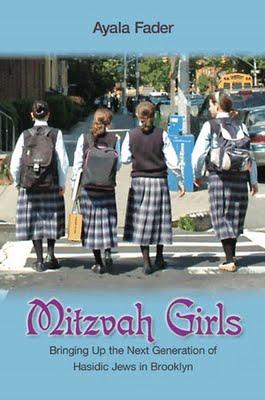Mitzvah Girls: Bringing Up the Next Generation of Hasidic Jews in Brooklyn

A “mitzvah” is colloquially translated as “a good deed,” but this Hebrew word actually means “commandment,” and observant Jews believe in 613 “mitzvot.” The commandments structure daily life and religious rituals, such as prayer, dietary habits, and romantic and sexual relationships. When a young woman becomes a Bat Mitzvah she is responsible for practicing and adhering to commandments outlined in the Torah.
Mitzvah Girls is Ayala Fader’s ethnographic study of young Hasidic girls becoming adults in a deeply structured religious community in Brooklyn, New York. There’s been almost no scholarship on this particular demographic, although as an anthropologist Fader understands that women are often responsible for bearing and reproducing culture. By studying children and young adults becoming women, Fader in effect presses the pause button and allows the reader to observe the moment girls become Jewish women.
Fader’s rich ethnographic research takes her into the homes, synagogues, and schools of Boro Park, a Hasidic neighborhood in Brooklyn. She is especially interested in the history, structure, and use of Yiddish, and in how linguistics shape and reflect everyday Jewish life. Fader explores words themselves to illustrate how meaning shifts in relationship to religion and gender.
Hasidic Jews are stereotypically right wing, one of the guaranteed Republican voting blocs in New York City, and gender roles are rigidly defined in Hasidic communities. Women are expected to raise large families, keep kosher households, and visit the Mivkah—or ritual bath—after menstruation. Looking into the Hasidic world from the outside, I confess that it’s quite easy to judge, to assume that these women are victims. Mitzvah Girls challenges that assumption, and Fader’s in-depth study foregrounds Hasidic women’s agency. She demonstrates how young women and girls negotiate the secular world, its modern temptations, and even feminism. Mitzvah Girls is an extraordinarily fascinating read.
Fascinating look at the creation of the hierarchical mindset in a strict religious community. Can lead to an understanding of conservative and religious motivations by those who do not share those attitudes.
since classic feminists are either secular , athiest-tending, or anti fundamentalist religions , they can't relate in an unbiased way to anyone with a different weltanshaung . it is quite fair of the reviewer to admit to her biases , but this work will allow one a method to interface non-'western' 'leftist-type' cultures.....